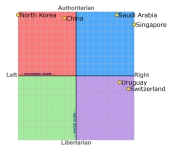
 2
2




This post and the seven that follow were split off from the Living without money thread found here: https://permies.com/t/40/14161/Living-money




"But if it's true that the only person over whom I have control of actions is myself, then it does matter what I do. It may not matter a jot to the world at large, but it matters to me." - John Seymour




 2
2




Nina Jay wrote:It's true the government can do almost anything. Speaking as someone who lives in a very regulated economy called The Welfare State.
However, I have found that they very rarely bother to actually force a citizen do something. All government officials that I have come across with personally have just given me advice, helping me to follow the rules but not punishing me. If I work with them, they are mostly willing to compromise. Even though the rules are very strict in theory. This is just my experience and I do realize that I may have been lucky and things could have gone differently.
 1
1




john mcginnis wrote:"Although the govt would love for us to pay taxes on our barters, there's very little they can really do about it if we don't. Even if the govt could somehow levy taxes on barter, it would be very easy to stay under the radar. I mean, we know that a great percentage of the population works under the table and the govt can't do anything about it even though they are paid in govt-printed money. So enforcing taxation upon barter would be a losing proposition in terms of money spent on undercover agents or however they would have to do it."
Well the ole gumn't has a term for barter -- 1230 exchange. Even have a whole book of rules no how to calculate it. And never mind about the gumn't fussing over 'lost causes' they are the Saint of Loss Causes. Just look at their balance sheet! They would be right happy to send 2 IRS agents and 4 FBI guys to pick your pockets for the $1.50 you made on the barter. Just 'cuz you understand. We don't want the citizens getting uppity.
"Also, just as you want men to do to you, do the same way to them" (Luke 6:31)
 1
1








Dale Hodgins wrote:The little village in the Philippines also has a Futures Market. Suppose your pig is pregnant, and you need 100 pesos for something. One of your relatives may give you the 100 pesos, but when the baby pigs are born, you owe them pick of the litter. And it doesn't have to be 100 pesos. Maybe the family has run out of rice or bananas. The lender supplies that product instead of money.
Those little pigs are worth several times that much, so it's like dealing with a loan shark, where you get seriously screwed. Financial ussery is not limited to wealthy New York banks. This sort of arrangement can loan money against just about every future possibility that these folks have. Loan money until a really meagre old age pension check comes in. Loan money until the corn is harvested. Loan money against other money that is being sent for school fees. Of course when the payment is made, there won't be enough money to pay the school fees. This can get them in trouble with whoever is paying those school fees. I know that the rich often screw poor people out of everything. Poor people are also very good at screwing one another. We're talking finances here not the reason there's a baby boom.😅
The worst abuses seem to happen when someone has run completely out of food. People who are hungry will make deals that do not help their future self.
When we went to the Village, one of Nova's uncles give us a chicken for supper. The next day he petitioned me to buy him a chainsaw. Nova said this would happen. As we were eating it, she said that I shouldn't have accepted the chicken. A chainsaw is worth about 25 of those chickens. She gave him 300 pesos which is about 6 American dollars and a little more than that chicken was worth. And she told him to go away and not bother us.
So it appears that people with little or no money will still find ways to create various financial instruments. Some are very helpful and some allow people to dig themselves a deep hole that they may not get out of.
 1
1




Nican Tlaca












"But if it's true that the only person over whom I have control of actions is myself, then it does matter what I do. It may not matter a jot to the world at large, but it matters to me." - John Seymour

|
professionalism is finding the perfect flavor of apathy --tiny ad
Fed up of Silicon Valley Social Media? Join Retalk, the place of great conversation
http://retalk.com
|


